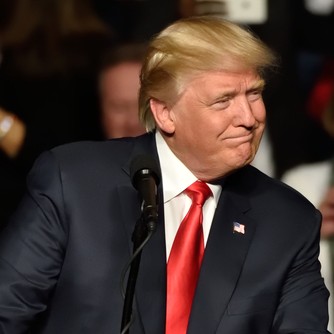Emoluments clause lawsuits against Donald Trump face uphill battle

President Donald Trump/Shutterstock
One of the most obscure and least-litigated clauses in the U.S. Constitution is about to get a lot of scrutiny from the federal judiciary. And the repercussions for President Donald Trump could be huge—provided the lawsuits can get past some significant procedural hurdles.
Since January, three lawsuits have been filed against Trump alleging that the president, through his various business dealings, is in violation of the emoluments clause, which prohibits officeholders from accepting gifts, titles or compensation from foreign governments without the consent of Congress. The suits allege that Trump profits when foreign governments pay for hotel rooms at Trump properties and conduct business with the Trump organization.
Trump had originally promised to put his business assets in a blind trust for the duration of his presidency, however, according to the New York Times, he has resisted doing so.
The first emoluments clause lawsuit was filed in January in the Southern District of New York by Citizens for Responsibility and Ethics (CREW) and several prominent legal scholars, including University of California at Irvine law Dean Erwin Chemerinsky, former Obama administration ethics lawyer Norman Eisen, Supreme Court litigator Deepak Gupta and Harvard law professor Laurence Tribe. In April, Restaurant Opportunities Centers United and Jill Phaneuf, an event booker for two Washington, D.C. hotels, joined the lawsuit.
This week, two more lawsuits were filed. On Monday, the attorneys general of Maryland and Washington, D.C. (along with CREW) filed a complaint with the U.S. District Court for the District of Maryland claiming Trump had not fully separated himself from his businesses. According to the Washington Post, the attorneys general said they would seek copies of Trump’s long-sought-after tax returns and other financial records.
On Wednesday, nearly 200 congressional Democrats announced they would file suit in the U.S. District Court for the District of Columbia arguing that Trump is required to obtain congressional approval before accepting any gifts or compensation. “Because [the President] has not sought congressional consent before accepting these foreign emoluments, nor provided information about them to Congress, [Congress is] unable to exercise their constitutional prerogative to authorize or reject the specific emoluments he is accepting,” the complaint said.
According to constitutional experts, the main hurdle for all three of these suits is whether the plaintiffs have standing to sue. University of Iowa law professor Andy Grewal tells the ABA Journal that “all three cases have serious standing problems” and that “the New York case seems stronger, but only because the other two seem so weak.”
He argues that the congressional lawsuit runs counter to established Supreme Court precedent that individual representatives or senators cannot challenge the president in court unless they suffer individual injuries. (The plaintiffs are filing as individuals and not on behalf of House of Representatives or Senate.) As for the Maryland case, he argues that state standing can be hard to establish, but notes that some courts (particularly the ones that have adjudicated the travel ban) have taken a broad view. The New York lawsuit, however, has a shot, according to Grewal, because it’s easier for private organizations to prove standing and because they recently added parties that can claim injuries.
Eisen, a former ambassador to the Czech Republic and co-founder of CREW who serves as co-counsel in the New York and Maryland lawsuits, disagrees. He tells the ABA Journal that all three cases should meet the standing requirement.
“Both the states and the members of Congress are harmed and both have standing, as do the hotel, restaurant and other plaintiffs in the SDNY case,” says Eisen. “With respect to congressional standing in the case filed today, it flows from the fact that, in an action unprecedented in American history, President Trump has refused to seek permission from that body for his many foreign emoluments. Neither has he been willing even to identify their extent or to provide information such as his tax returns that would allow such identification.”
It could be that Trump’s elusive tax returns are the main target of these various suits.
“There’s a good chance that the endgame here is to get more information about his financials,” says Andrew Hessick, a professor at the University of North Carolina School of Law. “Otherwise, I don’t know what the courts could do. I can’t see them forcing Trump to disgorge his profits.”
Hessick agrees with Grewal that all three cases are facing huge obstacles in establishing standing, but points out that anything can happen when the law ventures into previously uncharted waters.
“That’s the thing about lawsuits—lawyers and judges can be really creative,” says Hessick. “You never know what they might come up with.”
Write a letter to the editor, share a story tip or update, or report an error.


